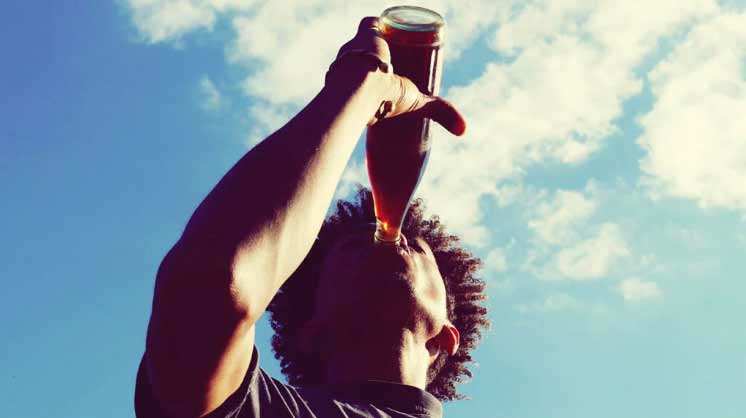
- Researchers examined the link between sugar-sweetened beverage consumption and male pattern hair loss.
- They found that men with male pattern hair loss consumed almost double the sugar-sweetened beverages of those without the condition.
- They noted that their findings are based on correlation, not causation and that further research is needed to confirm the link.
Male pattern hair loss (MPHL) is the most common form of hair loss in men, affecting around 30-50% of men by age 50.
Recent studies suggest that the rate of MPHL may be increasing. A survey from China found that the condition affected 21.3% of men in 2010 and 27.5% in 2021.
Research shows that nutrition plays an important role in MPHL. Some studies suggest that glucose metabolism may influence hair loss.
Further research into the link between MPHL and sugar consumption could inform lifestyle choices for men at risk of MPHL.
Recently, researchers from Tsinghua University, Beijing, China, examined the link between sugar-sweetened beverages (SSB) consumption and MPHL.
They found that higher consumption of SSB correlates to a higher risk of MPHL.
Medical News Today spoke with Dr. Ken L. Williams Jr., D.O., FISHRS, ABHRS, surgeon, and founder of Orange County Hair Restoration in Irvine, CA, and author of Hair Transplant 360 – Follicular Unit Extraction, not involved in the study, told MNT.
“Traditionally, most physicians or hair restoration surgeons understand that nutrients and diet play a key role in the overall health and well-being of our patients,” Dr. Williams noted. “Exercise, avoidance of tobacco products and illicit drugs, good nutrition, and a balanced diet are key to our patient’s health and longevity.”
The study was published in Nutrients.
Sugary Drinks And Hair Loss
The researchers recruited 1028 college students and teachers with an average age of 27.8 years from 31 provinces in China.
Participants received a survey in which they filled information about their:
- basic socio-demographic information
- hair status
- dietary intake
- lifestyle
- psychological status
Sugar-sweetened beverage consumption was determined from responses to the 15-item Beverage Intake Questionnaire, which examined their consumption of beverages in the last month. Sugar-sweetened beverages included:
- sweetened juice beverages
- soft drinks
- energy and sports drinks
- sweetened milk
- sweetened tea and coffee
Overall, 57.6% of participants reported MPHL, whereas the rest did not.
The researchers found that individuals with MPHL were more likely to:
- be older
- be current or former smokers
- have a lower education level
- engage in less physical activity
- have a shorter sleep duration
- have experienced severe anxiety or PTSD
- have a positive family history of MPHL
- have MPHL-related conditions
- dyed, permed, bleached, or relaxed hair
They further found that those with MPHL consumed more deep-fried food, sugar and honey, sweets and ice cream, and fewer vegetables than those without the condition.
People with MPHL also consumed an average of 4.3 liters of sugar-sweetened beverages per week compared to just 2.5 liters among those without the condition.
They further found that disease history influenced the link between SSB intake and MPHL. They also noted a link between the frequency of SSB intake and anxiety disorder, and anxiety disorder and MPHL.
The researchers noted that the association between SSB consumption and MPHL remained even after adjusting for possible confounders including sociodemographic factors, dietary intake, and psychological status.
How Sugar Intake Affects Hair
When asked how SSB consumption may influence MPHL, Dr.. Ai Zhao, Ph.D., Assistant Professor of Vanke School of Public Health at Tsinghua University, one of the study’s authors, told MNT that higher sugar consumption increases blood sugar concentration, which triggers polyol pathways, which convert glucose to other sugars.
She noted that in vitro and vivo studies show that this process reduces the amount of glucose in the outer parts of hair follicles, which may lead to MPHL. She added that sugar intake is often accompanied by excessive lipid intake, which is also linked to MPHL.
Dr. Zhao mentioned that previous studies have shown that high sugar intake is linked to mental health problems. One meta-analysis, for example, found that those who drank the equivalent of three cans of cola per day have a 25% higher risk of depression than those who don’t consume sugary beverages.
Limitations And Takeaway
Dr. Zhao noted that their findings are limited as they relied on self-reported data as opposed to clinical diagnoses. She also noted they did not gather data regarding the consumption of other sweetened products, and they could not distinguish the severity of MPHL.
Dr. George Cotsarelis, Professor of Dermatology at the University of Pennsylvania and Director at the University of Pennsylvania Hair and Scalp Clinics, not involved in the study, told MNT:
“The study only shows a correlation between sugary drinks and baldness. I doubt this is a real correlation because it is hard to imagine how sugary drinks could impact baldness. Furthermore, among the men they studied, the bald group had a higher percentage of men with a family history of baldness.”
“This means that the incidence of baldness would be higher in that group, so perhaps by chance, the sugary group had more men with baldness. I guess there is also a chance that the genes involved in baldness cause one to drink more sugary drinks. However, in general, I will not change the way I practice or the advice I give to patients based on this study,” he added.
Dr. Williams noted that the study is detailed and well-designed. However, he added that it doesn’t necessarily recommend eliminating all sugar-containing beverages.
“It concludes with the notion that advancing common sense prevails in matters involving overall health and nutrition. I recommend always having a balanced diet and consuming healthy food groups and nutritional sources. Avoid tobacco products, drugs, and excessive alcohol intake,” he concluded.
Important Notice: This article was originally published at www.medicalnewstoday.com by Annie Lennon where all credits are due. Fact checked by Ferdinand Lali, Ph.D.
Disclaimer
The watching, interacting, and participation of any kind with anything on this page does not constitute or initiate a doctor-patient relationship with Dr. Farrah™. None of the statements here have been evaluated by the Food and Drug Administration (FDA). The products of Dr. Farrah™ are not intended to diagnose, treat, cure, or prevent any disease. The information being provided should only be considered for education and entertainment purposes only. If you feel that anything you see or hear may be of value to you on this page or on any other medium of any kind associated with, showing, or quoting anything relating to Dr. Farrah™ in any way at any time, you are encouraged to and agree to consult with a licensed healthcare professional in your area to discuss it. If you feel that you’re having a healthcare emergency, seek medical attention immediately. The views expressed here are simply either the views and opinions of Dr. Farrah™ or others appearing and are protected under the first amendment.
Dr. Farrah™ is a highly experienced Licensed Medical Doctor certified in evidence-based clinical nutrition, not some enthusiast, formulator, or medium promoting the wild and unrestrained use of nutrition products for health issues without clinical experience and scientific evidence of therapeutic benefit. Dr. Farrah™ has personally and keenly studied everything she recommends, and more importantly, she’s closely observed the reactions and results in a clinical setting countless times over the course of her career involving the treatment of over 150,000 patients.
Dr. Farrah™ promotes evidence-based natural approaches to health, which means integrating her individual scientific and clinical expertise with the best available external clinical evidence from systematic research. By individual clinical expertise, I refer to the proficiency and judgment that individual clinicians acquire through clinical experience and clinical practice.
Dr. Farrah™ does not make any representation or warranties with respect to the accuracy, applicability, fitness, or completeness of any multimedia content provided. Dr. Farrah™ does not warrant the performance, effectiveness, or applicability of any sites listed, linked, or referenced to, in, or by any multimedia content.
To be clear, the multimedia content is not intended to be a substitute for professional medical advice, diagnosis, or treatment. Always seek the advice of your physician or other qualified health providers with any questions you may have regarding a medical condition. Never disregard professional medical advice or delay in seeking it because of something you have read or seen in any website, video, image, or media of any kind. Dr. Farrah™ hereby disclaims any and all liability to any party for any direct, indirect, implied, punitive, special, incidental, or other consequential damages arising directly or indirectly from any use of the content, which is provided as is, and without warranties.







